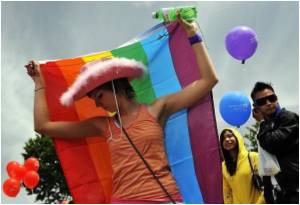To celebrate the Gay parade in Istanbul, an event that has taken political significance from anti-government protests, tens of thousands of people took to the streets

While Turkey's lesbian, gay, bi and transgender (LGBT) community enjoy better rights than in most Muslim countries, many see the event as a chance to be themselves without fear of reproach.
"I have not 'come out' yet to my father, my mother or my friends," protester Senef Cakmak told AFP. "Today is the only time of year that I am myself. I don't have to hide from anyone."
Homosexuality is not a crime in Turkey, but homophobia is widespread and often accompanied by violence.
One person who knows that more than most is Michelle Demishevich, a transgender journalist who recently saw through the conviction of a woman who assaulted her - a first for Turkey.
"We have to constantly fight against the lifestyle and the rules that are imposed on us and teach tolerance in our society," she said.
In 2010, Selma Aliye Kavaf, a member of Prime Minister Recep Tayyip Erdogan's party and then the Minister for Family and Women, sparked outcry in the gay community when she called homosexuality a "disease" that "needs to be treated."
LGBT organisations played a key role in the 2013 Gezi Park protests against Erdogan's rule, a movement that took issue with the perceived authoritarian nature of his administration.
"In Turkey, we all have difficulty exercising our rights," said Aykut Yanak, a participant in the march. "This is why we must fight and why we all walk together today."
Source-AFP
 MEDINDIA
MEDINDIA


 Email
Email




